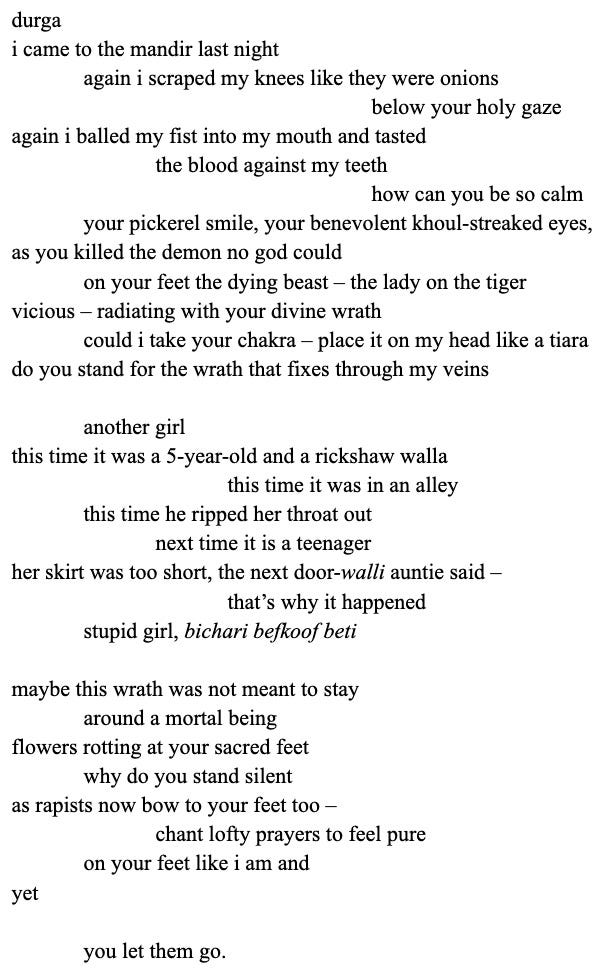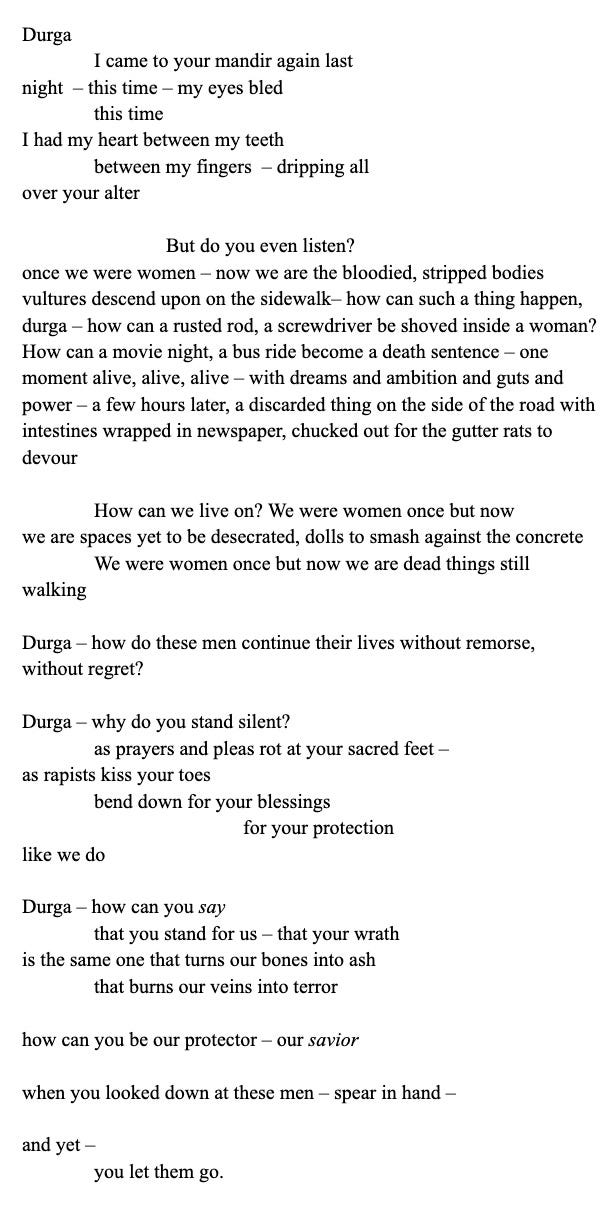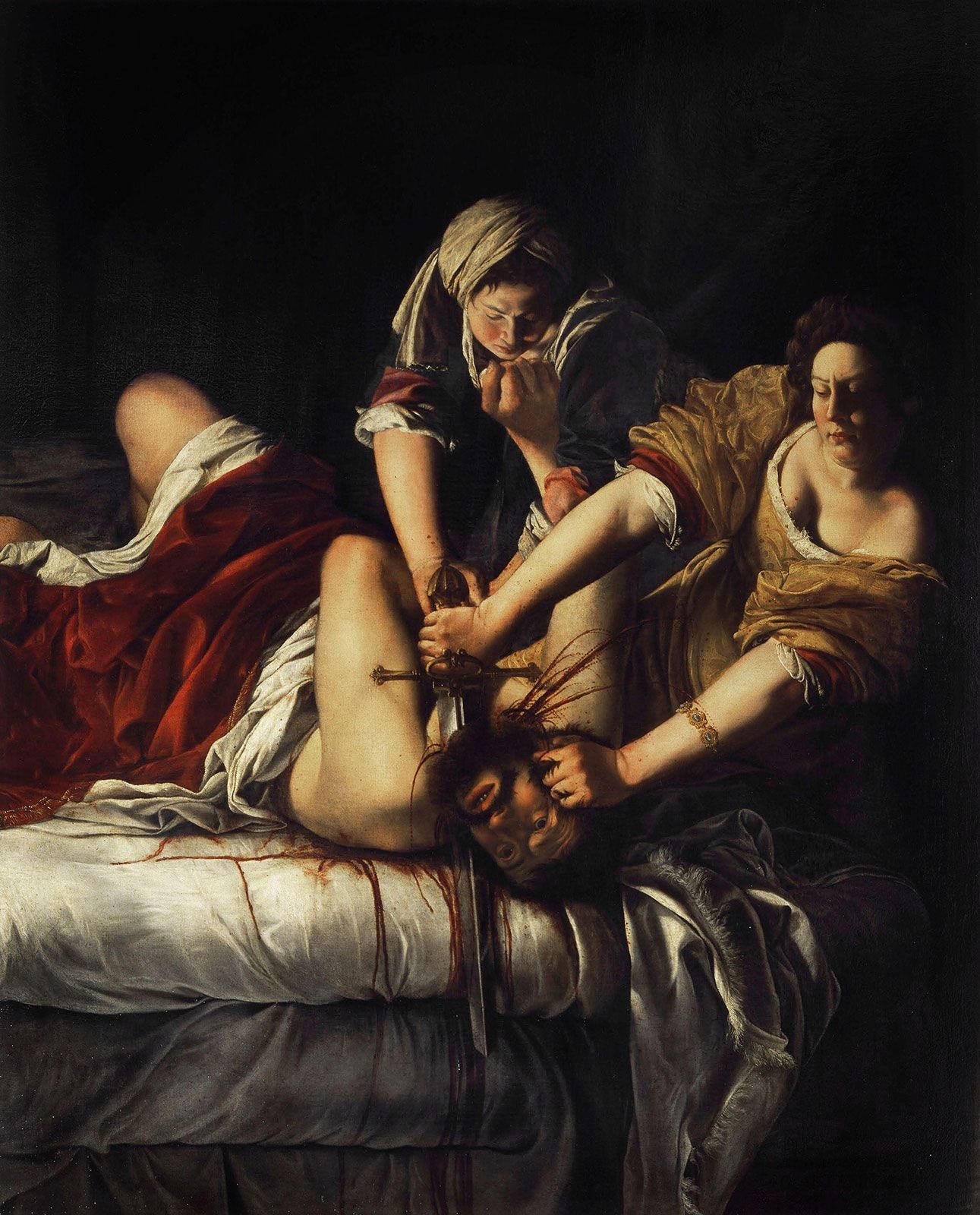will this ever end?
on the Kolkata rape case: a plea - a cry - a scream - but is it enough?
such wrath was never meant to stay around a mortal being

I don’t even know where to start with this.
I am writing this with so much rage, fury, and anger. But I know it comes to nothing — I feel so helpless, so absolutely in despair, because this will continue to happen again and again and again.
But the fact of the matter is, women and girls are raped every. single. day in India. It has just become “another facet of life” — another corner of the newspaper our eyes glance — another article about an uncle doing something to his niece, a husband to his wife, or a rickshaw driver to a 5-year-old. It becomes so normal that we can look away — frown, feel disgusted, but carry on.
But only when the worst of the worst happens — when hell descends upon earth and wrecks the most unimaginable carnage — do we look, do we get out of our seats and speak. Our anger will get us on the street. It will lead us to spread stories, tweets and reels across the internet. It has led me to write this very blog post.
Eventually, though, the news will become old in two to three weeks. Maybe a month. We will move on, and get angry at the next unsolved issue: perhaps news of another test fraud, another student drowning in an illegal coaching centre basement, or another mind-boggling case of corruption.
Then, what happens after that?
We thought we were going somewhere after Nirbhaya. Every time something like this happens, perhaps there is hope, at least this time things will get better — at least this time people will understand what happens when you rape, torture and murder a woman. You think that perhaps people will think twice before committing such soul-crushing violence.
Will the safety of women ever be taken seriously — something that goes beyond partisan sloganeering and manipulation of our trust? Will our anger ever be used for anything other than to disseminate more political propaganda — or will it actually be considered a real issue, rather than an election one?
Rape in India is a systemic issue — from the very root of our cultural and social interactions to our media and entertainment industries and the highest levels of government.
This keeps happening — rapists go to sleep comfortably after they commit such heinous crimes.
We will get enraged again — go on the streets, protest, demand justice — but when will this ever stop?
Part I: the silenced women
“You can’t clap with one hand. It takes two hands to clap. A decent girl won’t roam around at 9’o clock at night. A girl is far more response for rape than a boy” — Mukesh Singh, one of the men who gang raped Jyoti Singh (Nirbhhaya).
In India, the amount of reported rapes per annum is about 36,000 cases, which means that every day 90 rape cases happen in India. In reported cases, it is calculated that 2.6 rape cases happen per 1 lakh people in India. This seems very low in comparison with the US’s 27 cases per lakh, the UK’s 36 and Sweden’s 60. 1
But using this number is deceptive: it only looks at the number of registered cases. Due to societal pressures and unbelievably rigid patriarchal norms, women don’t often report these cases at all — and even when they do, there have been cases in which policemen don’t even file an FIR. Estimates suggest that around 86% of rape cases are unreported.2
As well as that, marital rape is not considered rape in India: in India’s new penal code, (Bharatiya Nyaya Sanhita, or BNS), as well as in the former Indian Penal Code, it is legal.3 With this, it is estimated that 99% of cases in India go unreported.4 Marital rape refers to the “non-consensual sexual intercourse with one’s spouse”.5 Because of the stigma around divorce in India, many women are stuck in relationships that are extremely exploitative, abusive, violent and traumatic. It is predicted that “[m]ost sexual violence in India occurs within marriages but it is estimated that only about 10% of victims report spousal sexual abuse”.6
It is horrifying the way rape culture continues to persist throughout our society: women and girls are the ones to blame, the ones who are not sensible enough. We see this especially in the cases that really blow up, including this one. The gang rape cases that cause the most outrage out of all have some features in common.
More often than not, these rapes are committed in a metropolitan city
The victim is either a middle or upper class woman
She has/had a “respectable” profession — in both the Nirbhaya case and the Kolkata doctor one, they were in the medical profession
It was a scenario in which rape is conventionally not thought to happen — in a place that was supposed to be safe
She is not supposedly the “type” of woman who is “asking for it”
In an Indian Express article titled “The Elephant is the Room”, the author writes that these women are “urban, professional, middle class”.7 When these circumstances come together, a rape is anger inducing because it almost clearly indicates the victims helplessness. We are able to see them as people who didn’t “draw too much attention to themselves”. In such situations, we can hardly blame the victim. In such situations, it remind us that anyone, any woman and girl can be brutally raped and murdered, no matter how sensibly they are brought up to be.
This is not to negate or say that the outrage seen right now is not justified — it is more than justified, it is necessary and essential. But we need to be cognisant of who we are making the face of these movements and discussion and what the implications of that are. When we have a woman who is irrefutably innocent and unprovocative, comes from a background of sensibility and some privilege. It emphasises who we think is worth fighting for. Perhaps these examples are used to show that rape is not a woman’s fault. But it may also give the message that, in some cases, it isn’t. In the cases that matter, they aren’t. Are we, in this fight for justice, excluding women who exercise freedom beyond the confines of societal expectations?
“…[P]atriarchal discourse permeates all sections of society, typecasting women into adjunct tropes of mother, sister, wife or daughter. A woman is never just enough on her own.” — Paromita Chakrabarti, The Elephant is the Room8
Our society is so intent on putting the blame on women. The rape of any homeless girl or a woman who may have been out partying is not taken seriously. Almost all sexual derogatory terms refer to women (sl*t, wh*re, b*tch, c*nt). We are so focused on the circumstantial evidence that led to the rape, because by highlighting that, we can see what the women was actually up to. In almost all recounts of the Kolkata doctor’s rape, it was emphasised that she was on a 36 hour shift, tired and exhausted beyond belief.
It is with this circumstantial evidence we determine who is worthy or not to fight for. By doing this, we put the blame on the woman. We restrict them and their freedom to do what men have always done because men will never understand. Boys will be boys. What do you expect. We will ask our women and girls questions like: What were you doing so late at night alone? What sensible girl does that? But we will never ask our boys how they could dare lay hands on a woman without her consent. We will stop our girls from going out, but never the men who commit these crimes.
We will denounce such atrocious gang-rapes, decry that India is not safe for women — but are we selective with the women that we choose to protect, the women that we choose to call “India’s daughters” and the ones we insult and degrade to the status of animals?
Are we selective with the men that we attack and push to the ground, complicit to those who are in positions of power even within our own families? We whisper amongst ourselves, tell our daughters and sisters to stay away from certain men, but why aren’t we fighting to break these power structures that hold us down? Why do we whisper the things that everyone knows happen, but no-one dares to say too loudly?
We look and call rapists monsters. We make it seem like they are some form of rarity, some pure evil that has descended on earth, an animal amongst men, a devil in the night. But the reality is — like the woman who are raped — these men too are sons, fathers and brothers. These men were not born as monsters, psychopaths or blood-thirsty sadists. They are men of our society and culture, products of our media and norms, traditions and customs.
Madhumita Pandey, as a 22-year-old psychology student, interviewed over a hundred rapists, asking them a single question: why? In an interview with The Hindustan Times she said:
“When I went to research, I was convinced these men are monsters. But when you talk to them, you realise these are not extraordinary men, they are really ordinary. What they’ve done because of upbringing and thought process.”
“Everyone’s out to make it look like there’s something inherently wrong with (rapists). But they are a part of our own society. They are not aliens who’ve been brought in from another world.”9
These men are the very product of our society, of the culture in which we live in. She adds on and says:
“In my experience, a lot of these men don’t realise that what they’ve done is rape. They don’t understand what consent is.”10
This is the very root of the problem. There is no notion of consent, that a woman is a being with emotions and feelings and not an object, a doll that you can do whatever with without consequences. Our films, music, and popular continuously reinforce this, to the point in which we have extremely twisted notions on the role of women in society and what “love” looks like.
Maybe… that is what “love” ends up looking like in real life. Because what Oscar Wilde says rings true to this day: “Life imitates Art far more than Art imitates Life”.
Our film industry needs to be more responsible… but is it willing to do that at the cost of profit?
Part II: Durga
two versions of the same poem
TRIGGER WARNING: these poems may be very disturbing for some readers. NONE of the details in these poems are exaggerated. Unfortunately, this is real life: this is the gruesome, gruesome reality we live in. It is the same reality we are letting more and more of our daughters (and sons) live through. Reader discretion advised
POEM #1
POEM #2
Part III: hope hope hope… and yet such hopelessness
“I come from an India were we worship women by day and gang-rape them at night” — Vir Das
I still hope that one day India will be a place in which women and men are treated and respected equally — in which boys are not enforced with a tremendous amount of expectation to be “a man” (or whatever that means) to lead them to treat women they way they do.
We have a deeply entrenched societal issue — and that issue starts with us. We cannot continue blaming everything and everyone else if we don’t start changing the way we raise our sons and boys, if we keep reinforcing highly toxic messages on what it means to be a man.
Are we teaching young boys to be “real men” at the cost of them being good human beings?
Ending: A Burning
Thank you for reading.
This post was one that took me quite some time to write. I still have a lot more to explore on this topic, so you can expect at least the next post to be something along these lines.
I hope you enjoyed this work. I would love to hear what you have to say: do leave a comment on your thoughts, opinions and reflections on this topic. I read every single one of them and it makes my day.
If you would like to continue supporting me as a young artist, like, subscribe and share this post with someone. It helps me tremendously.
Beyond this article: I want to say — keep the fire burning. As long as it does, we have some hope that things can change.
(pssstt… before you go… my best friend is on substack!! check out her first post and give her loads of love < 3)
More on the Kolkata Doctor Rape Case
Further reading/watching
The Elephant in the Room: What we don’t talk about when we talk about rape — The Indian Express
In India’s Gang Rape Culture, All Women Are Victims - NYT Opinion
I am a woman doctor and I was taught to keep quiet. Kolkata rape shattered my bubble - The Print
Ibid
Agarwal, Nandini et al. “Marital rape and its impact on the mental health of women in India: A systematic review.” PLOS global public health vol. 2,6 e0000601. 21 Jun. 2022, doi:10.1371/journal.pgph.0000601. link
Ibid
The Elephant in the Room: What we don’t talk about when we talk about rape — The Indian Express (I highly recommend this article)
Ibid
‘Ordinary men, not monsters’: Woman who interviewed more than 100 rape convicts — The Hindustan Times
Ibid







This is amazing. I'm Pakistani and so much of what you said also happens in Pakistan aswell. Society does not let us talk about our experiences, doesn't let us point at our abusers and say "that man touched me without my consent. He raped me. He did it multiple times. He does it to multiple girls". So many time we're forced to sit between these men and eat dinner. Fucking shove food down our throat and try to forget what their face was like when it was happening. If not that, we're just killed and discarded like a tissue paper. Used and forgotten. This case in particular is so disgusting. It makes me want to ask those people, who see a rape case on headlines and say "she was out too late" "she probably provoked him" "this is what happens when you have boyfriends" "uska kirdar hi aisa tha". Because what could a doctor, after a 36 hour shift, wear or do to seduce God knows how many men? Was she out late because of her kirdar or because she was helping people live? They raped and murdered her in the place where people heal others. They left her there, bones broken and naked. It's disgusting. They're all disgusting. And it's so scary because you're right, rapists aren't some rare species who you could maybe bump into. They are everywhere. They could be the cashier you tipped or your landlord. It could be anyone. Anywhere. So why should women be shamed for being cautious? For keeping their distance? For being scared? If every woman has to bear the weight of fear, why can't every man bear the weight of suspicion? For us, it's all men when we're out in the mall. And yet baatein bhi hum sune. Chup bhi hum rehein. Burqa bhi hum kerein. Rape bhi humara ho. Lekin takleef unn aadmion ko jo her rape case ke comment section mein "not all men" ke naarein legate hein. Wah. How unfair. Thank you for writing about this and I'm sorry for the long comment. Just like you, I'm always angry. Always. I hope the world can come to its senses soon. I hope no girl has to ever go through something like this. And for now I can only hope.
**Everyone** should read this post. You did such a fantastic job in spreading even more information on the terror of what women and girls are going through every single day. I could feel the fire burning inside me as I read it, the urge to just yell at every monster in the world to make them go away, but sadly, that's not how the world works. Your poems gave me chills. The fury and fear and determination and desperation; I can feel it imprinted in those words. "We were women once, but now we are dead things still walking." Thank you for writing this ^^